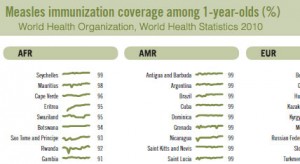Outbreak updates
 We have been following the outbreaks in Africa with great concern. In a nutshell, the great progress that has been made against measles, coupled with a global economic downturn stressing already thin public health budgets, has precipitated a withdrawal of funding for measles. Unfortunately this is the exact wrong time to stop the pace of vaccinating, as when measles outbreaks are rare the only way to confer immunity to a population is through those vaccinations. If a given population (e.g. children under 2) has never been exposed to measles, even one small outbreak can threaten to become an epidemic amongst that highly susceptible population. This WHO report (around page 75 and then again around 150) has detailed measles incidence data for every country, and you can see that in 2008 virtually all of the countries now having epidemics had zero cases of measles recorded. For those who don’t want a 200 page report, here’s a single image that provides a lot of information.
We have been following the outbreaks in Africa with great concern. In a nutshell, the great progress that has been made against measles, coupled with a global economic downturn stressing already thin public health budgets, has precipitated a withdrawal of funding for measles. Unfortunately this is the exact wrong time to stop the pace of vaccinating, as when measles outbreaks are rare the only way to confer immunity to a population is through those vaccinations. If a given population (e.g. children under 2) has never been exposed to measles, even one small outbreak can threaten to become an epidemic amongst that highly susceptible population. This WHO report (around page 75 and then again around 150) has detailed measles incidence data for every country, and you can see that in 2008 virtually all of the countries now having epidemics had zero cases of measles recorded. For those who don’t want a 200 page report, here’s a single image that provides a lot of information.
This IRIN article has some pretty scary quotes, including this little blurb that causes us great concern,
Oladapo Walker, the Inter Country Support Coordinator for Eastern and Southern Africa at the World Health Organisation (WHO), told IRIN that at least 95% of all eligible children had not been vaccinated against the disease.
Presumably when he says “eligible children” he means infants between 9 and 12 months of age (WHO policy is not to do vaccinations for children over one year, unless during a “catch-up” campaign — we’ve reported criticism of this policy previously). To confer herd immunity a population needs to be approaching the inverse of that number quoted above — 95% vaccinated, not 95% unvaccinated. So in the case of a country like Zambia, which hasn’t had a widespread measles inoculation campaign since 2007 (in which a little over 2 million children were reached), many, many infants born since 2007 will be unvaccinated. (Fortunately for Zambia there is a country-wide campaign scheduled 2 days from now — more on that in another post)
The Nation reports that 19 have died in Dowa, Malawi after church leaders prevented the children from receiving vaccinations. As we previously reported, Doctors Without Borders is in the process of vaccinating nearly three million children in an effort to stanch this epidemic (here is an interesting firsthand account from a doctor there) — an epidemic which is officially now the worst outbreak in more than a decade. Unfortunately, a couple night ago a fire broke out at a vaccine storage site in Malawi’s capital, Lilongwe, destroying almost $300,000 in vaccines (roughly a million vaccines). The vaccines were donated to the Malawian government by MSF (Doctors Without Borders), and this is certainly a set back, in light of their current measles epidemic and the campaign to vaccinate 6 million children, which is scheduled to begin in August. The Malawi government has downplayed that this fire will cause any interruption to the campaign.
We also recently posted about Zimbabwe completing a vaccination campaign of 5 million children (with Unicef funding), and WHO is reporting that a decline in the outbreak has now been observed. The UN recently reported that only a third of Zimbabwe’s appeals for aid have been met, with six million people (50% of the country!) lacking access to safe water and sanitation. Access to clean water and sanitation is a Millennium Development Goal. Unfortunately Zimbabwe’s neighbor, Zambia, is in the grip of its own epidemic, and having financial difficulties in responding both on local and nationwide levels.
Ethiopia has had more than 2,000 cases of measles since the beginning of this year, and that number continues to rise.
And lastly, the UN Foundation (a Global Measles Initiative partner) confirms the $59 million shortfall for measles funding required this year in order to prevent a resurgence in deaths. We previously noted this shortfall (along with a prediction of 1.7 million deaths from 2010 to 2013) after it was reported in the LA Times.
For us, all of this news serves only to punctuate the timeliness of what we are trying to do — humanity is so close to being rid of measles, but aggressive vaccination is still required until the last case on the planet has come to pass. If you’re reading this I urge you to help us make a difference, whether you donate a dollar, a thousand dollars, or e-mail us wanting to come help with a project, your involvement will matter.








